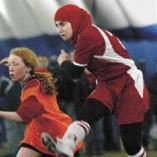 “Why are we talking about the niqab yet again? Once more this non-issue has hit the headlines.
“Why are we talking about the niqab yet again? Once more this non-issue has hit the headlines.
“It is obvious that in light of the difficulties our schools are facing in tackling bullying, drug abuse, alarming rates of truancy, gang culture, knife and even gun crimes, and teacher abuse; the niqab certainly does not merit the Department for Education’s attention nor subsequent front page headlines in the news.
“A handful of girls wanting to observe the niqab should not be an issue and it should certainly not attract so much media coverage. All that this achieves is to provide further fodder for the ‘it’s those bloomin’ Muslims wanting more special treatment’ camp….
“The impact of the most recent circus surrounding the niqab will empower the Islamaphobes and force Muslims to stop debating the issue of the niqab internally, and unite against a perceived attack on their religious freedom. As a result, the natural progression of the niqab debate among Muslims may have once again been hampered.”
Rajnaara Akhtar of Protect-Hijab at Comment is Free, 21 March 2007

 Veils will be banned in schools to help pupils learn and to keep them safe, Education Secretary Alan Johnson has ruled.
Veils will be banned in schools to help pupils learn and to keep them safe, Education Secretary Alan Johnson has ruled. “Labour must be more principled at a time when the whole notion of equal rights for men and women is under attack from religious extremists.
“Labour must be more principled at a time when the whole notion of equal rights for men and women is under attack from religious extremists.